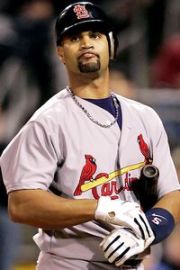The Yankees lost out on another potential trade target when Gio Gonzalez was traded to the Washington Nationals for a package of prospects. At the price the Nationals paid, the Yankees probably weren’t a player for Gonzalez anyway, so the trade really doesn’t alter the team’s offseason strategy. However, it does further an interesting development taking place around baseball, and particularly in the N.L. East.

Nationals' fans may get down on their knees after their team acquired widely coveted Gio Gonzalez. (Photo: Getty Images)
There are a variety of differing opinions on Gonzalez. Some believe he is gradually emerging as one of the best young arms in the game, while others suspect he may not be able to continue outperforming his relative inability to throw strikes. As with most young pitchers, it’s hard to predict what path Gonzalez will take in Washington, but regardless, the Nationals’ aggressive move speaks volumes about the internal view they have about their team as well as the economic boom taking place throughout the game.
When the Angels signed Albert Pujols and C.J. Wilson, we learned that Arte Moreno’s shopping spree was being funded by a new multi-billion television deal. Similarly, the Rangers aggressive spending since being sold to the ownership group fronted by Nolan Ryan has been linked to TV money. Now, it seems, we can also add the Nationals to that list.
According to a report in the Washington Examiner, the Nationals are in the process of negotiating a new payout from MASN that could be substantially higher than the $29 million fee they currently receive. With the expectation of increased revenue, the Nationals’ decision to accelerate their rebuilding strategy makes perfect sense. Even though Gonzalez, who is entering his first year of arbitration eligibility, won’t cost the Nationals much initially, the price in prospects was very steep. The team’s willingness to cash in so many future chips for instant gratification must mean the Nationals either think they are ready to contend now, or have the financial wherewithal to significantly expedite the process. When Washington broke the bank to sign Jayson Werth last year, many pundits scratched their heads, but clearly, the organization has adopted a very optimistic outlook. Even though GM Mike Rizzo probably already regrets the decision to sign Werth, it says a lot that he and owner Mark Lerner remain undeterred in their attempts to quickly improve the team.








